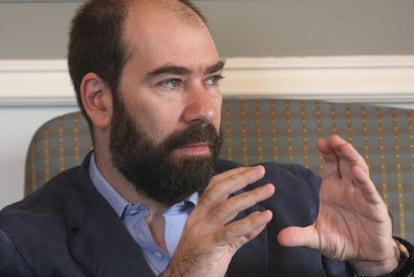"I set myself two rules: not to create any characters, and just one take"

While the rest of the Spanish-speaking world has been puffing out its chest at Cannes, with the unveiling of a host of Argentinean, Mexican and Colombian productions, Spain has been keeping a low profile at this year’s festival with just six titles.
Italian filmmaker Dario Argento’s Drácula; Elefante Blanco by Argentinean director Pablo Trapero and Infancia clandestina by his countryman Benjamín Ávila, are all backed by Spanish money. Then there’s the Spanish-financed portmanteau film 7 días en La Habana, which has a section directed by Julio Medem; Antonio Méndez’s Aquí y allá; and, last but not least, the better-known Jaime Rosales in the Directors’ Fortnight with Sueño y silencio (or, Sleep and silence).
Rosales’ fourth feature is a brave reflection on decency and indecency in death, told via the story of a Spanish couple with two daughters who live in Paris and suffer a car accident while vacationing in the Ebro Delta. The eldest daughter dies, and when her father comes out of a coma he doesn’t remember the existence of his offspring.
In black and white and made by shooting only one take of each scene (not a single one was repeated), Sueño y silencio contains authorial details and buried emotions. “I see films in which violence or sex appear in an opportunistic way, and in my case I keep at a distance with the camera, as well as from what the actors are giving me,” says the director of La soledad.
That detail about the performance is significant, because all the film’s actors are amateurs. “When I make a film I make an object with a very precise shell and a hollow inside, so the viewer fills it with what the film gives them. Because for me, as the director, the film comes to me from a detail or a text that is insignificant.”
I make films with a precise shell and a hollow inside, for the viewer to fill”
Sueño y silencio’s origins lie in the biblical stories of Isaac’s sacrifice and Calvary. They were the inspiration for the artist Miquel Barceló to paint two paintings for the camera in two scenes that bookend the film, but ended up not being such a big element of the final product. “The two paintings that he did in front of the camera are his illustrations of that driving force,” says Rosales.
Rosales is a big Barcelona fan and he likes to find parallels between soccer and cinema. “Why did Chelsea win the Champions League? Because they have an idea, their own one — Barça has a different one — about soccer that they are 100-percent convinced about and they think will bring them success. They have always been faithful to it. But chance comes into play \[and\] helps them: \[players hitting the\] posts, goals at every attempt. Chelsea were the worst of the four semifinalists. But they trusted in their idea and that finally brought them success,” he says.
Rosales thinks his own way of working is the same: “I create the situation, and I set myself two rules: just one take — there would be no repetitions — and we would not create characters but rather look for people to perform as they are. And we will be faithful to them until the end. Of course things fall apart in the editing, but in the end betting on something will boost your work.”
One example: a scene in a crematorium where the main character is crying in a close-up and suddenly three women appear in the background having a banal conversation, a gem of a moment. “I think circumstance, chance helped me there,” says Rosales.
Tu suscripción se está usando en otro dispositivo
¿Quieres añadir otro usuario a tu suscripción?
Si continúas leyendo en este dispositivo, no se podrá leer en el otro.
FlechaTu suscripción se está usando en otro dispositivo y solo puedes acceder a EL PAÍS desde un dispositivo a la vez.
Si quieres compartir tu cuenta, cambia tu suscripción a la modalidad Premium, así podrás añadir otro usuario. Cada uno accederá con su propia cuenta de email, lo que os permitirá personalizar vuestra experiencia en EL PAÍS.
¿Tienes una suscripción de empresa? Accede aquí para contratar más cuentas.
En el caso de no saber quién está usando tu cuenta, te recomendamos cambiar tu contraseña aquí.
Si decides continuar compartiendo tu cuenta, este mensaje se mostrará en tu dispositivo y en el de la otra persona que está usando tu cuenta de forma indefinida, afectando a tu experiencia de lectura. Puedes consultar aquí los términos y condiciones de la suscripción digital.








































